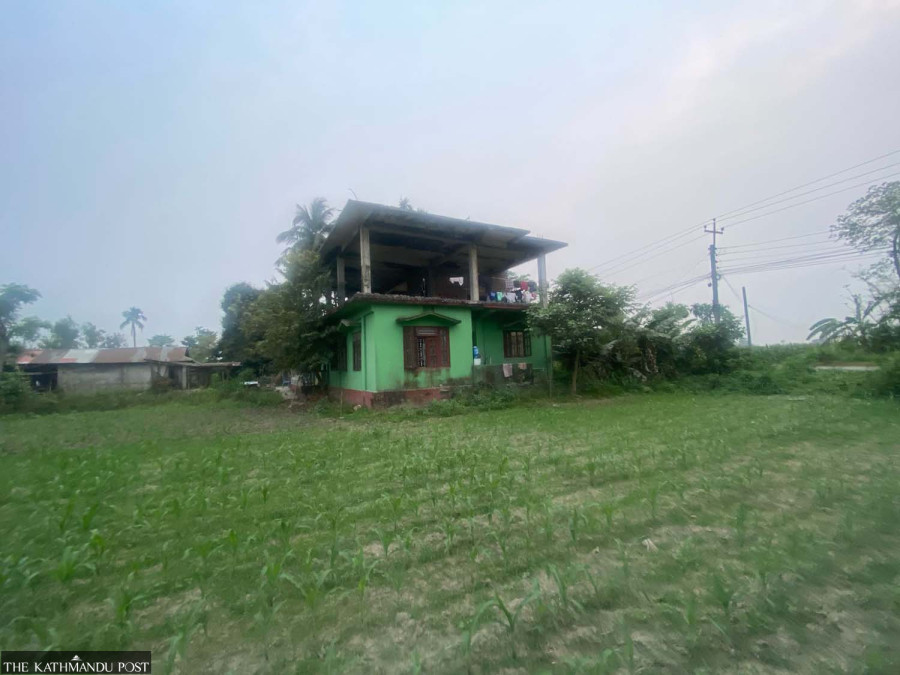Koshi Province
East-West Railway delay leaves landowners without pay
People in several districts in eastern Nepal have been barred from cultivating, selling or developing their land since 2020.
Parbat Portel
The East-West Railway project, initiated in 2020 during the premiership of KP Sharma Oli, promised to revolutionise transport infrastructure across the southeastern part of the country. However, nearly five years later, thousands of affected residents in Jhapa, Morang and Sunsari district are still awaiting compensation for the land that the government acquired for the railway project. Their land is stuck in limbo—leaving them in hardship and uncertainty.
The 120-kilometre stretch between Kakadbhitta in Jhapa and Inaruwa of Sunsari requires the acquisition of around 760 bigha (around 515 hectares) of land across approximately 5,400 land plots. As the land has been officially marked for the railway project, the landowners have been barred from cultivating, selling or developing their properties.
With no compensation in sight, their collective demand is clear: either provide compensation immediately or release the lands that remain frozen. Ironically, Prime Minister Oli is back in office, but the problem remains unresolved.
"We feel like prisoners on our own land. We can neither farm nor sell it,” said Ranjit Prasai from ward 9 in Birtamod Municipality of Jhapa. As per the alignment, his house lies directly in the path of the proposed railway. “The government should immediately provide us compensation or release our properties,” he demanded.
For Kailash Paudel of ward 9 of Damak Municipality in Jhapa, the railway plans shattered his livelihood. He had been growing vegetables on his modest plot of around 1,015 square metres to support his family. "Since the day the government fixed boundary marks, everything has come to a halt. Neither compensation has arrived, nor are we allowed to work the land,” he lamented.
Hundreds of families across the region face similar challenges. Their main source of income—their land—has effectively been taken away without payment. Tek Bahadur Bhandari from ward 6 of Kamal Rural Municipality in Jhapa invested Rs1 million in a poultry business on his six-kattha of land (around 2,031 square metres), which now falls within the railway’s path. His investment is lost and the land’s legal status has only deepened his woes.
According to Prasai, even a small portion of land marked for railway use renders the entire plot legally frozen, impacting property transactions and bank dealings. "Without swift action on compensation, victims will only suffer more," he warned.
An estimated Rs25 billion is needed to compensate all affected individuals but only Rs2 billion was allocated in the last fiscal year of 2023-24. Shockingly, this budget was not disbursed. Gyanendra Niraula, secretary of the Railway Victims Compensation Coordination Committee, claimed the allocated funds were returned unused. "Instead of distributing it to the victims, the Department of Railways returned the money," he vented his ire. According to Niraula, the victims have met with top leaders, including the prime minister, multiple times, but nothing has changed. “Everyone says it will be done, but justice never arrives,” he added.
The Department of Railways admits to delays in distributing compensation for the acquired land and other properties. Kamal Bahadur Sah, spokesperson of the department, said that the lack of budget created hurdles in compensation distribution. “We couldn’t decide whom to pay and whom not to with only Rs2 billion budget. So we returned the funds,” he said. "Unless a required budget is ensured, distribution is not possible."
According to Sah, both Prime Minister Oli and Physical Infrastructure and Transport Minister Devendra Dahal are aware of the issue. Minister Dahal, during a recent visit to Jhapa, assured that the compensation process would move ahead swiftly. “We’re in the final decision stage: either we pay compensation and proceed or we release the land,” Dahal had said. But his words have yet to translate into action.
Even though the government set up a liaison office in the Prime Minister’s hometown in Damak to facilitate compensation, it currently operates with just five staff members in a downsized office paying Rs 40,000 in monthly rent. “If the compensation work were completed, the office could be closed. But nothing has been resolved,” Sah admitted.
Laxmi Prasad Mainali, chair of the Compensation Coordination Committee, accused the government of irresponsibly putting development dreams ahead of people’s livelihoods. “Last year’s Rs2 billion was returned unused, while we kept knocking on leaders’ doors for justice,” he said. He also warned that if their voices continue to be ignored, they will launch a series of protests and seek legal remedies. “We are preparing for a phase-wise protest against the government's unaccountable actions in the name of development,” Mainali warned.




 15.57°C Kathmandu
15.57°C Kathmandu















